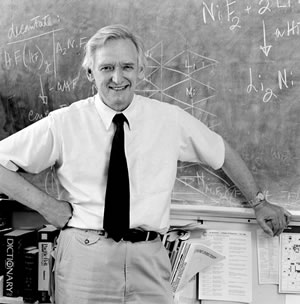Neil Bartlett (chemist) facts for kids
Quick facts for kids
Neil Bartlett
|
|
|---|---|
 |
|
| Born | 15 September 1932 Newcastle-upon-Tyne, England
|
| Died | 5 August 2008 (aged 75) Walnut Creek, California, United States
|
| Nationality | British |
| Citizenship | US |
| Alma mater | King's College, University of Durham (Newcastle University) |
| Known for | Creating the first noble gas compound |
| Awards | Corday–Morgan Prize (1962) Steacie Prize (1965) Elliott Cresson Medal (1968) Welch Award in Chemistry (1976) William H. Nichols Medal (1983) Davy Medal (2002) |
| Scientific career | |
| Fields | Chemistry |
| Institutions | University of British Columbia Princeton University University of California, Berkeley |
Neil Bartlett (born September 15, 1932 – died August 5, 2008) was a super smart chemist. He was really good at working with a chemical element called fluorine. He became famous for making the very first compounds (which are like chemical mixtures) using "noble gases." Before him, scientists thought noble gases were too "lazy" to mix with other chemicals! He taught chemistry at the University of British Columbia and the University of California, Berkeley.
About Neil Bartlett
Neil Bartlett was born in Newcastle-upon-Tyne, England, on September 15, 1932. His interest in chemistry started when he was just eleven years old. While at Heaton Grammar School, he did an experiment where he made "beautiful" crystals. He mixed ammonia water with copper sulfate.
Neil loved chemistry so much that he built his own small lab at home. He bought chemicals and glass tools from a local store. Later, he went to King's College, University of Durham in the United Kingdom. This university is now known as Newcastle University. He earned his first degree in 1954 and then a higher degree in 1958. He studied inorganic chemistry, which is about chemicals that don't usually contain carbon.
In 1958, Neil Bartlett started his career as a chemistry teacher at the University of British Columbia in Vancouver, Canada. He eventually became a full professor there. It was during his time at this university that he made his amazing discovery. He found out that noble gases could actually react and form chemical bonds. He stayed there until 1966.
After that, he moved to Princeton University to teach chemistry. He also worked at Bell Laboratories, a famous research center. In 1969, he joined the chemistry department at the University of California, Berkeley. He taught there until he retired in 1993. He also worked as a scientist at Lawrence Berkeley National Laboratory from 1969 to 1999. In 2000, he became a citizen of the United States. Neil Bartlett passed away on August 5, 2008. He lived with his wife, Christina Bartlett, and they had four children.
His Amazing Discoveries
Neil Bartlett's main area of study was the chemistry of fluorine and compounds that contain fluorine. In 1962, he made a huge breakthrough. He created the very first noble gas compound. He called it xenon hexafluoroplatinate.
This discovery was a big deal because it went against what scientists believed at the time. They thought that all noble gases were completely "inert," meaning they wouldn't react with other chemicals. But Neil Bartlett proved them wrong! After his first discovery, he made several other fluorine compounds using xenon, like XeF2, XeF4, and XeF6.
Awards and Recognition
Neil Bartlett received many awards for his important work.
- In 1968, he was given the Elliott Cresson Medal.
- In 1973, he became a Fellow of the Royal Society in the United Kingdom. This is a very high honor for scientists.
- In 1976, he received the Welch Award in Chemistry. This award was for his work in making chemical compounds from noble gases. His discoveries opened up many new areas of research in chemistry.
- In 1977, he was chosen as a Fellow of the American Academy of Arts and Sciences.
- In 1979, he was honored as a Foreign Associate of the National Academy of Sciences.
- In 2002, he won the famous Davy Medal. He received it for showing that noble gases were not so "noble" (or unreactive) after all. Other famous scientists, like Robert Wilhelm Bunsen (who invented the Bunsen burner), had also won this medal.
- In 2006, his research on noble gases was named an International Historic Chemical Landmark. This happened at the University of British Columbia. It was a recognition of how important his work was for understanding how chemical bonds work.
- Neil Bartlett was nominated for a Nobel Prize in Chemistry every year from 1963 to 1966, but he did not win the prize.
A Lab Accident
In January 1963, something scary happened in the lab. Neil Bartlett and his student, P. R. Rao, were working with a new compound they thought might be XeF2. As they leaned in to get a closer look, the compound exploded! Pieces of glass flew into their eyes.
According to Bartlett, he thought the compound might have had water in it, and he and Rao had taken off their safety glasses to see better. Both men had to go to the hospital for four weeks. Neil Bartlett's vision in one eye was damaged. It took 27 years for the last piece of glass from that accident to be removed from his eye. This story shows how important safety is in a science lab!
 | Audre Lorde |
 | John Berry Meachum |
 | Ferdinand Lee Barnett |

